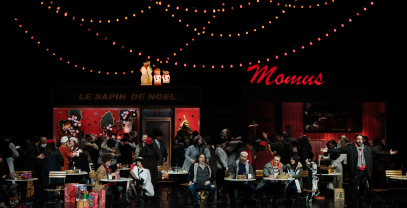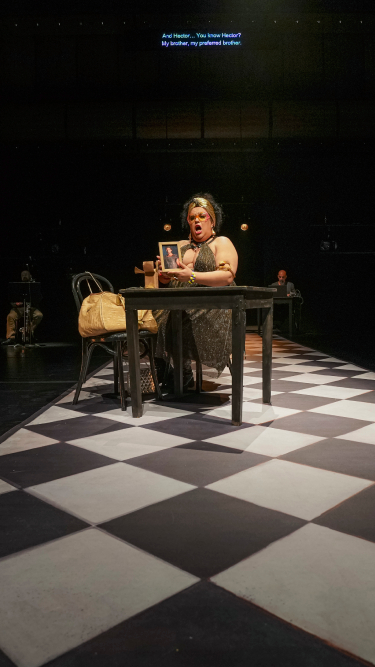
Opera
LA BOHÈME
Giacomo Puccini
Opera
Pablo Ortiz / Sergio Blanco
75'
From to
The GNO Alternative Stage opened the 2024/25 season with the daring, contemporary chamber opera Kassandra by the distinguished Argentinian composer Pablo Ortiz and a libretto by the renowned Uruguayan dramaturg Sergio Blanco. Kassandra is an international co-production with the Centro de Experimentación of the prestigious Teatro Colón in Buenos Aires. On 27, 28, and 29 September 2024, Kassandra met the Athenian audience at the GNO Alternative Stage at the SNFCC, a month after its world premiere at Teatro Colón, where it caused a sensation, receiving rave reviews. As the largest newspaper in Argentina, Clarín, characteristically wrote: “Kassandra’s legend takes on a new dimension in an exceptional opera filled with emotional power and tension”. The transgender soprano Maria Castillo de Lima, a phenomenal vocal talent, took on the leading role, with direction from Diana Theocharidis and Alexandros Efklidis. With the participation of musicians from Ergon Ensemble, under the baton of Nicolas Vassiliou.
The GNO Alternative Stage and the Centro de Experimentación of the Teatro Colón in Buenos Aires commissioned Pablo Ortiz to adapt Sergio Blanco’s monologue Kassandra into an opera. The leading character, Kassandra, is destined to wander at night on the outskirts of a nameless city in search of clients. Through the music, she blends the terrible with the sublime, the profane with the sacred, the contemporary with the ancient, and the myth with the present. She also pairs the dramaturg’s aesthetic with the composer’s, illustrating their joint work on the ever-shifting interplay of past, present, and future. Although so far apart, these universes are included in a single space, according to the directorial concept of Diana Theocharidis and Alexandros Efklidis.
“I am not a man, I am not a woman, I am Kassandra”
Uruguayan playwright Sergio Blanco, one of the most fascinating and intriguing voices in the contemporary global theatre scene, wrote Kassandra in Athens in 2008. Inspired by the legend of Kassandra, he wrote a heart-wrenching monologue. In this modern adaptation, the famous heroine from Troy is transformed into a transgender immigrant. Feeling like a foreigner in her own body, she tells her story in broken English, expressing her feelings of solitude, isolation, and the desire to be understood. The play had an amazing run, showcased over thirty times across five continents. It was held in various venues, from alternative theaters to prestigious stages like Le Palais des Papes in Avignon, Teatro Colón in Buenos Aires, and the Greek National Opera.
The chamber opera Kassandra carries the signature of the award-winning Argentinian composer Pablo Ortiz, who is a professor of composition and music theory at the University of California, Davis, and has made a significant contribution to modern music. The opera, which will be presented on the GNO Alternative Stage conducted by Nicolas Vassiliou and featuring musicians from Ergon Ensemble, is tailored to the unique voice of transgender soprano Maria Castillo de Lima, famous for her groundbreaking career in the sphere of opera.
Buenos Aire – Athens
The opera Kassandra's stage direction is credited to Diana Theocharidis, a Greek individual who currently resides and works in Buenos Aires, and Alexandros Efklidis. The two directors have created a performance about the modern challenges of identity and acceptance, telling the story of a woman who possesses the gift of prophecy but is condemned not to be believed by anyone. “Kassandra, the cursed priestess of ancient Greek mythology, possesses the gift of foreseeing the future. However, like all the oracles of the ancient Greek world, she also sees the past; the oracle’s insight encompasses both the present and the absent. Given the gift of prophecy, Kassandra was cursed by the god Apollo for her words to not to be believed by anyone. Inside her, there is inherent both the tragic fate of humanity and that of the stranger, the refugee and the socially and gender marginalised. She sings and speaks in broken English, the English of someone who hardly knows the language and is driven by the desire to be understood.”, note the directors.
The funding body of the project is the Ministry of Culture, within the framework of the National Recovery and Resilience Plan "Greece 2.0" with funding from the European Union - NextGeneration EU.
Recorded in the Alternative Stage of the Greek National Opera at the Stavros Niarchos Foundation Cultural Center on 28 and 29 September 2024. Subtitles are available in Greek, English and Spanish.
Conductor: Nicolas Vassiliou
Stage directors: Diana Theocharidis, Alexandros Efklidis
Set and lighting designer: Gonzalo Córdova
Costume designer: Luciana Gutman
In the role of Kassandra María Castillo de Lima
With the participation of musicians from Ergon ensemble: Kostas Tzekos (bass clarinet), Charalampos Taliadouros (percussion), Konstantinos Pangiotidis (violin), Dimitris Travlos (violoncello)
Fill in your ticket in the field below
Don't have a ticket?
Please click below in order to buy tickets for the GNO TV performances.
...
